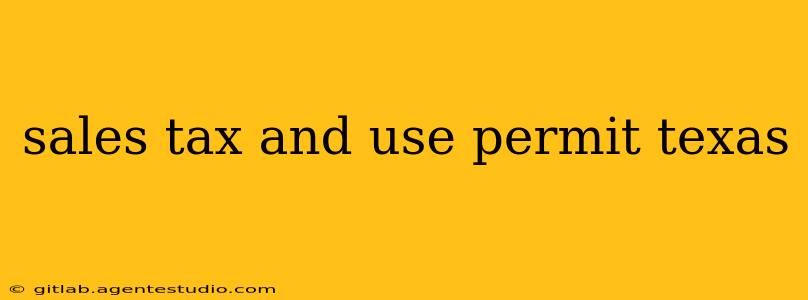Texas, like most states, requires businesses to collect sales tax on goods and services sold within the state. Understanding the nuances of Texas sales tax and the associated sales and use tax permit is crucial for businesses operating in or selling to Texas residents. This comprehensive guide will help you navigate the complexities of obtaining and maintaining a Texas sales and use tax permit.
What is a Texas Sales and Use Tax Permit?
A Texas sales and use tax permit (also sometimes referred to as a Certificate of Registration) is a license issued by the Texas Comptroller of Public Accounts that authorizes businesses to collect and remit sales tax on sales made in Texas. It's not just for brick-and-mortar stores; businesses selling online, through catalogs, or via other remote channels also need a permit if they meet certain thresholds. Importantly, even if you don't have a physical presence in Texas, you may still need a permit if you have nexus (a significant connection) with the state.
Who Needs a Texas Sales and Use Tax Permit?
The need for a Texas sales and use tax permit depends on several factors, primarily:
-
Nexus: This refers to a significant connection between a business and Texas. Nexus can be established through various means, including:
- Physical presence: Having a store, office, warehouse, or other physical location in Texas.
- Inventory: Storing goods in Texas.
- Employees: Employing people in Texas.
- Affiliate networks: Using affiliate marketers in Texas.
- Click-through nexus: (Although legally challenged) this generally refers to a high volume of sales originating from Texas through online advertising.
- Economic nexus: This generally means exceeding a certain threshold of sales into Texas in a given period. This threshold is updated by the Texas Comptroller and is subject to change. Check the latest guidelines on the Comptroller's website for the most up-to-date information.
-
Type of Business: The type of goods or services you sell will also determine if you need a permit. Certain industries may be exempt from sales tax, while others are subject to specific rules and regulations.
How to Obtain a Texas Sales and Use Tax Permit
Obtaining a Texas sales and use tax permit is generally straightforward and can be done entirely online through the Texas Comptroller's website. The process typically involves:
-
Registering online: You'll need to create an account and provide information about your business, such as your business name, address, tax ID number (EIN or SSN), and owner information.
-
Completing the application: The online application will ask for details about your business operations, including the types of goods and services sold and your anticipated sales volume.
-
Providing necessary documentation: You might need to provide supporting documentation, such as your business license or articles of incorporation.
-
Submitting the application: Once you've completed the application and submitted all the necessary documents, the Texas Comptroller will review your application and issue your permit.
Understanding Texas Sales Tax Rates
Texas has a state sales tax rate of 6.25%. However, local jurisdictions (cities and counties) can impose additional local sales taxes, leading to a higher combined sales tax rate in certain areas. It is essential to determine the appropriate sales tax rate for each location where you make sales to ensure accurate tax collection and remittance. The Texas Comptroller's website offers resources to help you find the specific tax rate for each location.
Filing Sales Tax Returns
Once you have your permit, you'll be responsible for filing regular sales tax returns with the Texas Comptroller. The frequency of filing depends on your sales volume. Accurate record-keeping is crucial for proper tax reporting, ensuring you avoid penalties and interest charges.
Penalties for Non-Compliance
Failure to obtain a permit or properly collect and remit sales tax can result in significant penalties and interest charges. The Texas Comptroller actively audits businesses to ensure compliance, and non-compliance can lead to legal action.
Seeking Professional Assistance
Navigating the complexities of Texas sales tax and use tax can be challenging. If you have questions or require assistance, consider seeking guidance from a tax professional experienced in Texas sales tax laws. They can help you ensure compliance, minimize tax liabilities, and avoid potential penalties.
Disclaimer: This information is intended for general guidance only and does not constitute legal or tax advice. Consult with a qualified tax professional for advice tailored to your specific circumstances.

